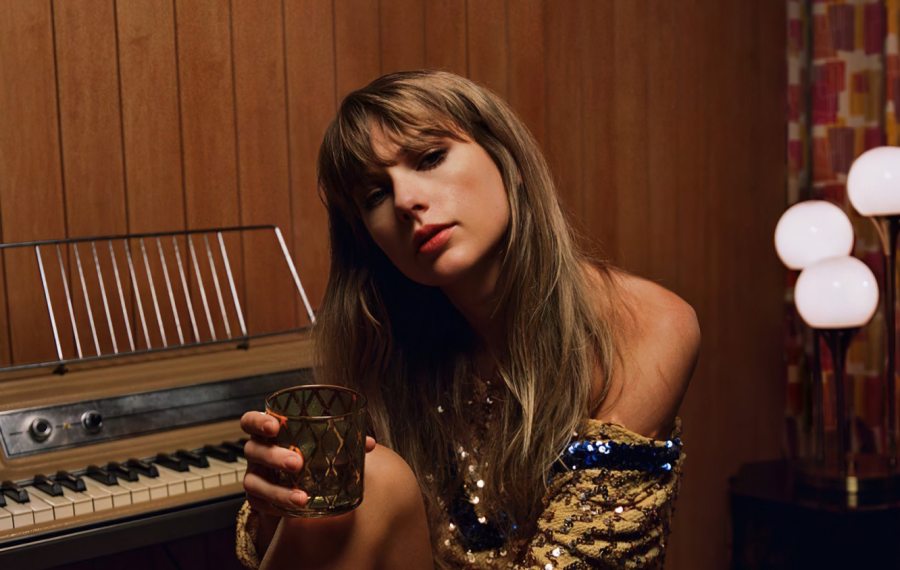Midnights: Taylor Swift’s Lavender-tinted Return to Pop
On her highly anticipated tenth studio album, Taylor Swift delves into the darkest parts of her mind, and presents her findings in the form of bubbly pop. It’s a multifaceted and flawed piece, but a worthwhile listen.
In the dead of night, as the clock strikes 12, Taylor Swift can be found contemplating love and loss alone in the dark. The product of this Machiavellian nighttime scheming? Her latest release: the concept album, “Midnights,” which spans 20 tracks and encompasses a whirlwind of emotions.
“Midnights” is a stark change from Swift’s previous two albums. Where “Folklore” and “Evermore” were whimsical and Shakespearian, “Midnights” is realistic and modern. Swift gives us an in-depth glance into her home, mind and life. But she’s also happy and content, making music fit for a dance floor for the first time in three years.
In truth, it takes a certain level of skill to mesh listenable, synthy pop beats with pessimistic and truthful introspection. It’s part of what makes Swift’s music so palatable and approachable — hard topics being broached subliminally, with sweeter metaphors and peppier beats than are really necessary.
She even attacks the sexist stereotypes placed upon her through subtle lyricism in the contemporary, dance-party-worthy opening track “Lavender Haze” (“All they keep asking me is if I’m going to be your bride”) but it’s presented to listeners so lightly that it takes a careful listen to really catch onto her meaning. It’s pop music, well-crafted at that, but with an edgier twist.
Swift’s knack for multitasking is stronger than ever and does yield results nine times out of ten, but after a while, it becomes monotonous and predictable.
Take “Bejeweled,” an anthem for the sparkliest of listeners about empowerment and independence, unfortunately overpowered by the heavy instrumentation and aggressive bassline. Does a straightforward pop single really need that many bells and whistles? The answer is no — it takes away from the song’s listenability. Instead of simply enjoying the song, all we hear is jumping sounds and a tune that doesn’t quite know what it’s supposed to be.
“Karma” succeeds where “Bejeweled” falls flat. Swift satirically pays tribute to “karma,” calling it “Sweet like honey, karma is a cat, purring in my lap cause it loves me.” You can hear Swift’s Cheshire cat smile and cloying grin, and the song doesn’t take itself too seriously.
While the perfect storm of emotions Swift showcases throughout the album is expertly syncopated, it becomes increasingly clear that something is amiss. Almost every song’s deeper meaning is obscured by overzealous production and flat, uninspired vocalization. It’s impossible to fully connect with songs such as “You’re on Your Own, Kid” or “Anti-Hero” because of how far removed we are from Swift’s voice itself; it’s as if the album is drowning in production.
So although the songs are anything but, Swift’s vocals are at times stale and leave much to be desired. It’s all you can do not to scream through the screen at Swift to just sing, leave behind the semantics and wordplay and simply vocalize.
Her vocals do have a rare moment of glory on the breathy and angelic “Labyrinth.” The track is reminiscent of “Folklore’s” “Epiphany,” and is dreamy and effortless. If only the album could be a continuation of her best work, and not a sideways curve into confusing, uncharted territory. Unfortunately, there remains a tangible disconnect between what she wants us to feel, and what we really do; we’re sifting through layers of autotune and production that doesn’t always fit just right.
It definitely is an underrated skill to flaunt vulnerability in all its glory, to bare one’s fears for an audience. The writing on Swift’s 10th album has depth and honesty, yet is also basic and oversimplified. “I should not be left to my own devices, they come with prices and vices, I end up in crisis,” is the pre-chorus on lead single “Anti-Hero.” For such a gifted writer, lyricism like this is half-baked, easy rhymes in place of deeper meaning. On the same album, just two tracks later, Swift sings, “I gave my blood, sweat and tears for this. I hosted parties and starved my body like I’d be saved by a perfect kiss,” The lyrics on “You’re on Your Own, Kid” are raw and candid, and exactly what Swift does best.
It’s clear the album has its high points, specifically on what Swift has dubbed the “3am Edition” of “Midnights,” which consists of seven extra tracks. They switch between acting as magnifying glasses into Swift’s psyche and grooving along slick, Lo-Fi beats.
Swift is effortlessly moody, providing peak Swiftian romance, on “Glitch”; the track immediately after is fan favorite “Would’ve, Could’ve, Should’ve,” a harrowing rendition of exploitative romance. In “Would’ve, Could’ve, Should’ve,” Swift writes with a truthfulness that can only be achieved by a seasoned artist. The song is a flurry of feelings deeply explored and then pushed aside in the name of growth. It is the caliber of songwriting that Swift is known for.
Although quite contrarian in nature from track to track, one thing is for certain about Taylor Swift’s “Midnights.” It’s pure Taylor Swift. Dancing, crying and dancing once again, her 10th work is a worthwhile experience, if not slightly whiplash-inducing. Although Swift’s songwriting has seen better days, she has made her return to dynamic, popular music, but in a more vulnerable state.
Nocturnal Taylor Swift is the most exciting Taylor Swift.




